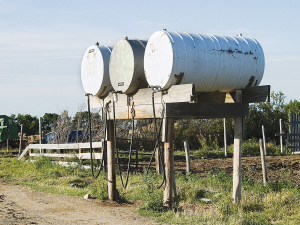Despite increased commodity prices, many farmers are feeling the pinch as costs like fuel, fertiliser and freight continue to rise.
Rising fuel costs have become a hot topic of late, no doubt driven by the fact that a tractor may consume 200 litres of diesel a day, while a forage or combine harvester can typically turn the dial at the pump to 1,500 litres per day.
With fuel tipped to remain at record highs for the foreseeable future and alternative fuels still a dream for the future, farmers and contractors are looking closely at ways to reduce their fuel usage now.
Carl Kingi, a business development manager for Teletrac Navman NZ, suggests that while the obvious areas of taking fewer trips to town and checking tyre pressures can help reduce overall consumption, GPS technology – also known as telematics – can deliver productivity and efficiency benefits.
“For better asset performance, operators can automate maintenance management using the system to send alerts when it’s time for a service, oil check or other essential maintenance,” he explains. “Industry experts suggest a poorly serviced engine can use up to 50% more fuel.”
Kingi adds that driving and operating behaviour has a big impact on fuel efficiency.
“Changes like reducing idle times and engine speed through careful monitoring, saves litres of fuel burnt per hour,” he says. “In practice, excessive idling and speeding reports can monitor activities which waste fuel, while also giving agricultural managers the visibility to identify and correct risky driver behaviour.”
Kingi reckons GPS tracking systems really come into their own with the ability to measure actual fuel burn using the power of artificial intelligence (AI).
“Real-time data collected in the field with the telematics system and partner hardware can generate fuel reports by vehicle, jobsite, fueling event, replacing algorithm calculations with actual measurements – including fuel burn rate in litres per hour.”
Kingi says another benefit of such a system for those running large commercial farms is knowing if they are eligible for RUC (Road User Charges) refunds from Waka Kotahi, based on mileages covered off public roads.
“The process can be tricky because it relies on getting accurate data. GPS tracking systems can remove the need to manually manage licenses, by allowing users to seek refunds, while also ensuring compliance,” he explains.
“Using second-by-second position records to track a vehicle’s mileage and calculate its on- or off-road activity throughout NZ can help rural businesses send rebate forms directly to Waka Kotahi and regularly claim RUC refunds without the hassle of manual calculations.”
Kingi suggests farmers consider making use of data-driven technologies and solutions, as these can contribute to improved fuel efficiency, RUC compliance management, staff safety, and other areas of day-to-day operations.
www.teletracnavman.co.nz











